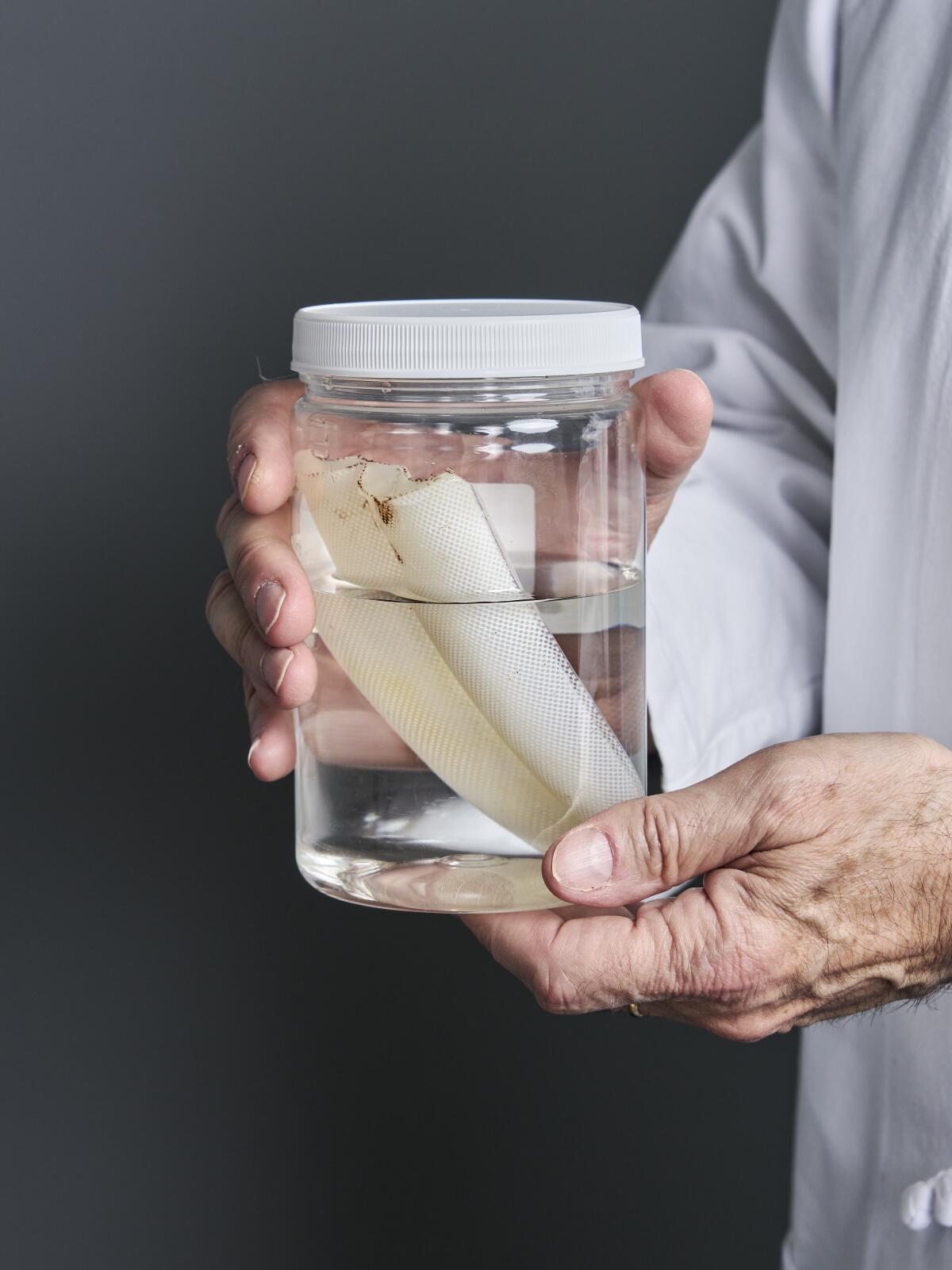Beverly Hills doctor behind penile implant is going on medical board probation

- Share via
A Beverly Hills doctor accused of “repeated negligent acts” involving patients who got penile implants must limit the number of surgeries he does weekly, under an agreement with the Medical Board of California.
The medical board accused Dr. James Elist of discharging patients without a clear plan for removing their sutures; discouraging them from getting follow-up care from other medical providers; and offering money to remove negative comments they posted online, among other alleged practices that veered from the “standard of care” for such patients.
Under an agreement with the medical board that goes into effect later this month, Elist will go on probation for five years. During his probation, he will be limited to performing 10 surgical procedures per week — with an exception for any emergency surgeries that must be done promptly — and must record conversations between employees and patients that are part of gaining their consent for surgical procedures.

Elist will also be required to complete courses in ethics, record keeping and clinician communication with patients, among other conditions.
In a statement, his attorney, Peter Osinoff, said Elist was a “highly respected urologist” who had helped thousands of men “using the best available medical advancements, including the penile implant that he invented.” The silicone Penuma device developed by Elist has since been rebranded as “Himplant.”
“As with any medical procedure, there are potential post-operative complications and a very small percentage of dissatisfied patients, as well as patients who were unfortunately noncompliant with post-operative instructions,” Osinoff said in the statement.
“In keeping with his history of continuous clinical improvement, and to resolve the matter with the medical board without further time and expense, Dr. Elist agreed to spend even more time with each patient by performing no more than 10 surgeries each week, and by adopting cutting-edge informed consent processes.”
Last year, when ProPublica published an investigation into patient complaints involving the implants, it reported that an attorney representing Elist said many specifics in the Medical Board complaint were false. Under his agreement with the medical board, Elist is giving up his right to contest the charges.
In a published study by Elist and other urologists of hundreds of patients who got the Penuma implant, the bulk of patients reported “high” or “very high” satisfaction years after their surgery. But the accusation lodged by the medical board against Elist described patients who said they had suffered pain or lost sensation.
In California, doctors trained as pediatricians, OB-GYNs and other specialties can take on lucrative — and potentially risky — cosmetic surgeries. Some have branched out with little or no surgical training.
The medical board said it launched its investigation after getting a complaint from a Massachusetts man who was told he could win a free surgery in exchange for appearing in a documentary film financed by rapper Percy Miller — better known as Master P — about his experience with penis enhancement, according to the accusation. Representatives for Miller did not respond to requests for comment on the medical board action.
The Massachusetts man told the medical board he was instructed on what to say in his interviews for the documentary. More than four years after the procedure, he began to suffer “significant pain,” which he believed was caused by the implant detaching and moving, according to the medical board accusation.
The investigation by the medical board faulted Elist for how he had cared for a dozen patients who underwent the surgery. One of them complained afterward about numbness, reduced length, and a lack of sensation that made him unable to have an orgasm, according to the medical board accusation.
The man had the implant removed, but continued to complain that he had lost sensation in much of his penis, was unable to have an orgasm, and had lost nearly two inches of length, the board said in its accusation.
In another case outlined by the medical board, a man who underwent surgery complained that the penile implant was “palpable and protruding,” and his incision line kept bleeding more than two months after surgery, according to the medical board accusation.
After Elist removed the implant, the patient was discharged with a permanent suture still in place and later told by the doctor’s office “to remove the suture himself,” according to the medical board accusation.
The doctor later paid the patient $5,000 after he signed an agreement releasing the doctor from liability, the medical board said in its accusation. Elist held onto another $1,000 payment until the man had removed all negative comments about his implant from online forums, which never happened, according to the accusation.
The medical board accusation also said some patients were required to sign paperwork saying they would “consult exclusively” with his office on any follow-up questions or procedures because “very few physicians beyond Dr. Elist have extensive knowledge of the implant procedure.”
Osinoff, the attorney representing Elist, said in his statement that “during the past two decades, he has worked to improve the implant, as well as the surgical procedure and care provided to patients. The device he invented received FDA clearance 20 years ago, and multiple times since then.”
Elist was also publicly reprimanded by the medical board five years ago for failing to maintain accurate medical records in his care of a patient.
Dr. Kalyanam Shivkumar wants to surpass the anatomical atlas created by a fervent supporter of the Nazi regime whose work was fueled by the dead bodies of its victims.
More to Read
Sign up for Essential California
The most important California stories and recommendations in your inbox every morning.
You may occasionally receive promotional content from the Los Angeles Times.













